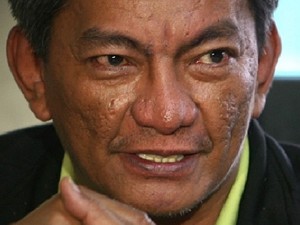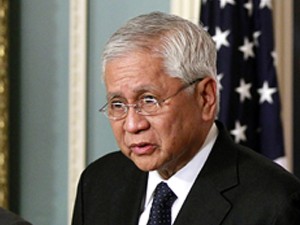LEGAZPI CITY, Philippines—Albay Governor Joey Salceda renewed his call for a boycott of made-in-China products to send a strong signal that Filipinos are united when the country’s sovereign territory and national dignity are faced with a foreign threat.
Salceda’s boycott movement started last year amid China’s “bullying” tactics in the Spratly Islands, parts of which are claimed by the Philippines, China and a few other countries.
He said that after China’s territorial incursions at the Scarborough Shoal off Zambales province, it is again “bullying” the country with the rejection of Philippine fruit exports on grounds they were infested by pests.
Salceda said his boycott movement was by no means a match to the Chinese military and economic power nor was it intended to bring China to its knees, “but it will draw global attention to their hegemonic ambitions as the loss of international goodwill will make its expansionist strategy very costly.”
“We are not against Filipino-Chinese, they are our friends and relatives. We are not against the Chinese people, on the mainland or anywhere in the world. What we are against is the China policy towards the Philippines perpetrated by their ruling political elite. Such policy ethos of hegemonic expansion is hurting our national honor, national interest, national territory and national sovereignty,” Salceda said in an interview in his office on Wednesday.
The governor said that since June 12, 2011, he has not stopped campaigning for the boycott of made-in-China products “since the China government cannot be trusted.”
Salceda, an economist, said the Philippines has been a big dumping ground for China’s cheap and inferior products, and a boycott would also protect children and communities from the pervasive and persistent risks of contamination from toxic chemicals in many of those products.
Salceda said that in 2010, the Philippines imported $7 billion worth of products from China against $6 billion in exports, or a trade deficit of $900 million.
He said in 2011, the Bureau of Customs recorded $12 billion in total Philippine-China trade but Chinese data from its General Administration of Customs placed total trade at $32.25 billion. Since there was no incentive to understate exports, the bulk of the trade underreporting would be in imports, Salceda said.
The data could mean that the value of China products smuggled into the Philippines could reach $14 billion year.
He also noted that compared to the made-in-China products, which are allegedly inferior in quality, most of the country’s export to China are “tradable commodities” such as minerals and plantation products that can be sold anywhere in the world, with price as the only issue.



